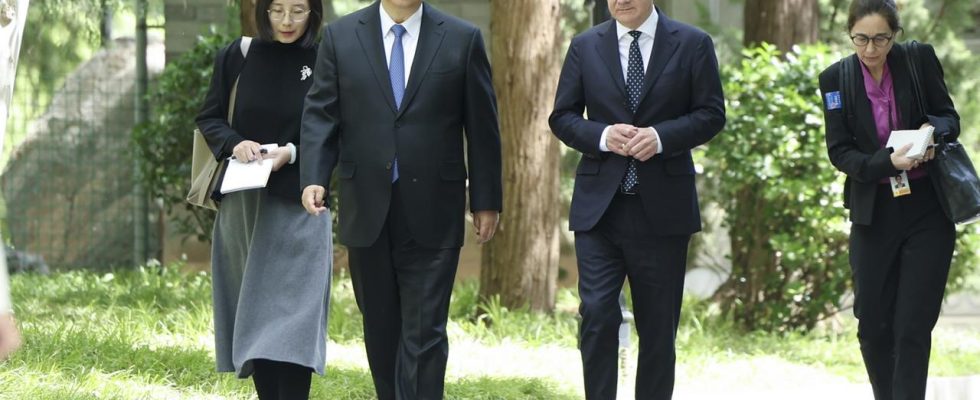The meeting between Chancellor Scholz and Chinese President Xi lasted more than three hours. The main topic was Ukraine. There was no promise that China would take part in a peace summit – but at least there were positive signals.
China and Germany want to advance efforts for peace in Ukraine together in the future. Exactly what China’s role could look like remained unclear after a meeting between Chinese President Xi Jinping and German Chancellor Olaf Scholz in Beijing.
Scholz was unable to persuade Xi to agree to Chinese participation in the Swiss peace conference planned for June. However, the two agreed to coordinate “intensively and positively” on this and possible further conferences.
Scholz and Xi spoke to each other for a total of three hours and 20 minutes – an unusually long time. The meeting began with an hour in a large group, followed by a 45-minute tea ceremony in private and finally a shared meal. Xi is said to have used this as a parable in reference to the solution initiatives in the Ukraine war: Everyone should be at the table, but no one should be on the menu, he was quoted as saying.
Different China’s statements on Ukraine
There were several different statements from the Chinese side regarding the efforts to hold the peace conference. The first statement said China would only support an international peace conference if it was accepted by both Russia and Ukraine. Russian President Vladimir Putin has already rejected the Swiss initiative and was not even invited.
The Chinese later added that they would continue to coordinate on this and other conferences. It ultimately remained unclear how willing Beijing was to take part in the summit in Switzerland.
The hosts want to invite a hundred countries and bring as many states as possible to the table that are friendly to Russia – especially China. The nuclear power with its 1.4 billion inhabitants is considered Russia’s most important ally. The conference in Switzerland depends on China’s participation.
Scholz asks China for help
From a German perspective, the Ukraine war was the number one topic in the political talks in Beijing. After the Chancellor’s first visit to China, Xi rejected Russian threats of a nuclear strike. Today this has been supplemented by the common demand not to attack nuclear facilities in the war zone.
The Chancellor later commented on the online service X. There he wrote that China’s word carries weight in Russia. He asked Xi to “influence Russia so that Putin finally stops his crazy campaign, withdraws his troops and ends this terrible war.”
Xi: Stable cooperation is important
Xi spoke of a “new era of turbulence and upheaval” in which the risks for all of humanity are increasing. “In order to solve these questions, it is essential that cooperation between the major powers prevails.” In this sense, stable cooperation between the major economies of Germany and China is important. “Together we can bring more stability and security to the earth.”
At the beginning of the conversation, Scholz urgently pointed out to Xi the devastating effects of the war. “Indirectly, they damage the entire international order because they violate a principle of the United Nations Charter: the principle of the inviolability of state borders,” said Scholz. “The Russian war of aggression against Ukraine and Russia’s rearmament have significant negative effects on security in Europe.”
Deliveries to Russia – not an issue for China
The West accuses China of supplying Russia with goods that can be used for both civil and military purposes and thus supporting the Russian war economy. Scholz had already made it clear before the meeting that he wanted to address this issue clearly. Xi did not address this in his statement. He simply said that China was “not a party or a participant in the Ukraine crisis.”
It was the Chancellor’s second trip to China since he was sworn in in December 2021. His inaugural visit in November 2022 was only a day trip due to the ongoing corona pandemic. This time he took three days – more than ever before for a single country on a trip.

